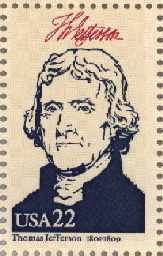
To the President of the United States (JAMES MONROE) Monticello, October 24, 1823DEAR SIR,-- The question presented by the letters you have sent me, is the most momentous which has ever been offered to my contemplation since that of Independence. That made us a nation, this sets our compass and points the course which we are to steer through the ocean of time opening on us. And never could we embark on it under circumstances more auspicious. Our first and fundamental maxim should be, never to entangle ourselves in the broils of Europe. Our second, never to suffer Europe to intermeddle with cis-Atlantic affairs. America, North and South, has a set of interests distinct from those of Europe, and peculiarly her own. She should therefore have a system of her own, separate and apart from that of Europe. While the last is laboring to become the domicil of despotism, our endeavor should surely be, to make our hemisphere that of freedom. One nation, most of all, could disturb us in this pursuit; she now offers to lead, aid, and accompany us in it. By acceding to her proposition, we detach her from the bands, bring her mighty weight into the scale of free government, and emancipate a continent at one stroke, which might otherwise linger long in doubt and difficulty. Great Britain is the nation which can do us the most harm of any one, or all on earth; and with her on our side we need not fear the whole world. With her then, we should most sedulously cherish a cordial friendship; and nothing would tend more to knit our affections than to be fighting once more, side by side, in the same cause. Not that I would purchase even her amity at the price of taking part in her wars. But the war in which the present proposition might engage us, should that be its consequence, is not her war, but ours. Its object is to introduce and establish the American system, of keeping out of our land all foreign powers, of never permitting those of Europe to intermeddle with the affairs of our nations. It is to maintain our own principle, not to depart from it. And if, to facilitate this, we can effect a division in the body of the European powers, and draw over to our side its most powerful member, surely we should do it. But I am clearly of Mr. Canning's opinion, that it will prevent instead of provoking war. With Great Britain withdrawn from their scale and shifted into that of our two continents, all Europe combined would not undertake such a war. For how would they propose to get at either enemy without superior fleets? Nor is the occasion to be slighted which this proposition offers, of declaring our protest against the atrocious violations of the rights of nations, by the interference of any one in the internal affairs of another, so flagitiously begun by Bonaparte, and now continued by the equally lawless Alliance, calling itself Holy. But we have first to ask ourselves a question. Do we wish to acquire to our own confederacy any one or more of the Spanish provinces? I candidly confess, that I have ever looked on Cuba as the most interesting addition which could ever be made to our system of States. The control which, with Florida Point, this island would give us over the Gulf of Mexico, and the countries and isthmus bordering on it, as well as all those whose waters flow into it, would fill up the measure of our political well-being. Yet, as I am sensible that this can never be obtained, even with her own consent, but by war; and its independence, which is our second interest, (and especially its independence of England,) can be secured without it, I have no hesitation in abandoning my first wish to future chances, and accepting its independence, with peace and the friendship of England, rather than its association, at the expense of war and her enmity. I could honestly, therefore, join in the declaration proposed, that we aim not at the acquisition of any of those possessions, that we will not stand in the way of any amicable arrangement between them and the mother country; but that we will oppose, with all our means, the forcible interposition of any other power, as auxiliary, stipendiary, or under any other form or pretext, and most especially, their transfer to any power by conquest, cession, or acquisition in any other way. I should think it, therefore, advisable, that the Executive should encourage the British government to a continuance in the dispositions expressed in these letters, by an assurance of his concurrence with them as far as his authority goes; and that as it may lead to war, the declaration of which requires an act of Congress, the case shall be laid before them for consideration at their first meeting, and under the reasonable aspect in which it is seen by himself. I have been so long weaned from political subjects, and have so long ceased to take any interest in them, that I am sensible I am not qualified to offer opinions on them worthy of any attention. But the question now proposed involves consequences so lasting, and effects so decisive of our future destinies, as to rekindle all the interest I have heretofore felt on such occasions, and to induce me to the hazard of opinions, which will prove only my wish to contribute still my mite towards anything which may be useful to our country. And praying you to accept it at only what it is worth, I add the
assurance of my constant and affectionate friendship and respect. |
